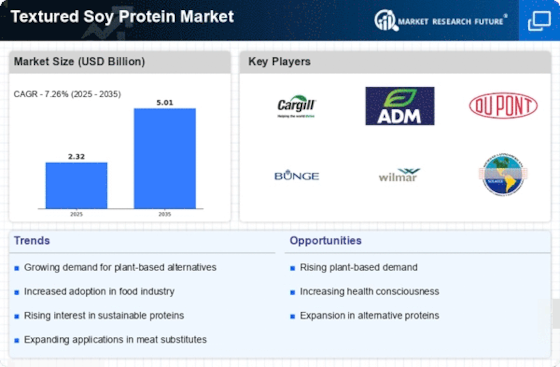Top Industry Leaders in the Textured Soy Protein Market

The textured soy protein market, a vital component within the plant-based protein sector, has experienced significant growth owing to the increasing demand for meat alternatives. Key players in this market adopt various strategies to secure and expand their positions, with factors such as product innovation, global distribution networks, and sustainability influencing the overall competitive landscape.
Key Players:
Major players in the textured soy protein market include Archer Daniels Midland Company, Cargill, DuPont de Nemours, Inc., Wilmar International Limited, and Sonic Biochem Extractions Limited. These companies have emerged as leaders, leveraging their technological capabilities, extensive supply chains, and broad product portfolios. Regional players, such as Victoria Group and Crown Soya Protein Group, contribute to the competitive dynamics, addressing specific market needs and enhancing the overall industry landscape.
Strategies Adopted:
To navigate the competitive landscape, key players in the textured soy protein market deploy strategic initiatives. Product diversification is a central strategy, with companies continuously introducing new formulations and variations to cater to evolving consumer preferences. Strategic partnerships with food manufacturers and retailers facilitate the integration of textured soy protein into a wide range of products, expanding market reach. Moreover, marketing efforts focus on promoting the nutritional benefits, cost-effectiveness, and sustainability aspects of textured soy protein to drive consumer acceptance.
Market Share Analysis:
Several factors contribute to the analysis of market share within the textured soy protein market. Research and development capabilities are crucial, as companies that can innovate and create high-quality textured soy protein products gain a competitive advantage. Robust global distribution networks ensure market penetration and accessibility to a diverse customer base. Adherence to regulatory standards, quality control measures, and certifications such as Non-GMO and organic play a pivotal role in building consumer trust. Brand reputation, customer relationships, and pricing strategies are also influential factors determining a company's market share.
News & Emerging Companies:
The textured soy protein market has witnessed the emergence of innovative startups and specialized companies focusing on unique formulations or processing methods. These emerging companies often introduce textured soy protein products tailored to specific dietary needs, such as gluten-free or allergen-free alternatives. Industry news suggests a growing trend of collaborations between textured soy protein manufacturers and fast-food chains to incorporate plant-based options into their menus. Additionally, mergers and acquisitions contribute to the evolving competitive landscape as companies seek to enhance their product portfolios and market presence.
Industry Trends:
Recent industry news highlights a trend of increased investment in sustainable and traceable sourcing of soybeans for textured soy protein production. Companies are responding to consumer demands for transparency and ethical sourcing by investing in supply chain sustainability. Moreover, advancements in processing technologies, such as extrusion and enzymatic hydrolysis, are gaining prominence, allowing for the production of textured soy protein with improved texture and taste. The industry is also witnessing investments in marketing campaigns to promote the environmental benefits of plant-based proteins, aligning with the broader trend towards sustainable and ethical consumption.
Competitive Scenario:
The textured soy protein market is marked by intense competition among key players aiming to establish themselves as leaders in the plant-based protein sector. Companies compete based on product quality, innovation, and the ability to meet the diverse needs of food manufacturers and consumers. The market's dynamic nature requires players to stay abreast of technological advancements, regulatory changes, and evolving consumer preferences. Given the increasing popularity of plant-based diets, textured soy protein manufacturers must balance product affordability with nutritional value and sustainability.
Recent Development
The textured soy protein market was the announcement by DuPont de Nemours, Inc. regarding the launch of a new line of high-performance textured soy protein isolates designed specifically for plant-based meat alternatives. This innovation aimed to address the growing demand for meat substitutes with enhanced texture and nutritional profiles. Additionally, Cargill revealed a strategic investment in expanding its textured soy protein production capabilities in response to the rising market demand. These developments underscore the industry's commitment to innovation and capacity expansion to meet the evolving needs of consumers and food manufacturers in the competitive landscape of textured soy protein.











